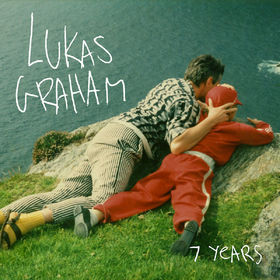Welcome back to Payoff Song, where we dive deep into the tracks that are making waves – or perhaps, in some cases, causing ripples. Today, we’re tuning into a song that you’ve undoubtedly heard, possibly even sung along to, and that’s “7 Years” by Lukas Graham. As content specialists here at Payoff Song, we’re not just about riding the wave; we’re about analyzing the currents. And with “7 Years,” there’s plenty to unpack.

Image: Album cover for “7 Years” by Lukas Graham, showcasing the band’s name and song title.
Lukas Graham, a Danish act fronted by Lukas Graham Forchhammer, achieved global fame with this 2015 release. While the band’s origins might surprise some, given the song’s distinctly mainstream pop sound, the Scandinavian influence in pop music is undeniable. Interestingly, Lukas Graham is structured more like a solo project with backing musicians, a detail that adds another layer to the perception of sincerity and personal narrative often associated with the song. And let’s just address it – Forchhammer is a strong surname, arguably more striking than the band’s chosen moniker itself.
Now, let’s talk about the music. “7 Years” operates within the familiar landscape of soulful piano-pop, a territory charted by bands like OneRepublic. There’s a definite Ryan Tedder-esque melodic sensibility woven into the verses, creating a sound that’s undeniably radio-friendly and commercially viable. Objectively speaking, the composition is… competent. It’s designed for sing-alongs, slow dances at school events, and those moments where a melody needs to carry a relatable message. In that sense, “7 Years” succeeds. It’s not going to offend your ears, and for many, it provides a sonic backdrop to reflections on life and growing up.
However, and this is where the critique sharpens, “inoffensive” doesn’t necessarily equate to “good” or “memorable” in the long run. “7 Years” treads a fine line, and for some listeners, it might just tip over into the realm of cloying and overly sentimental. While Meghan Trainor’s “No” might not be everyone’s cup of tea, it at least possesses a distinct personality. “7 Years,” in contrast, feels like a carefully constructed product designed to evoke a specific emotional response, perhaps too deliberately so.
The song taps into a vein of self-seriousness that’s become prevalent in pop music, reminiscent of acts like A Great Big World or Passenger. Forchhammer’s vocal delivery, while technically proficient, can lean towards a strained emotionalism, bringing to mind comparisons to Nate Ruess’s theatricality or Tyler Joseph’s sometimes whiny inflections. Lyrically, the song aims for earnestness, but lacks the lyrical dexterity or self-awareness that artists like Twenty One Pilots often bring to their similarly themed songs. It’s earnestness pitched at a Macklemore level, but without the humility that often grounds Macklemore’s work. The overall effect can be overwhelming, a sonic equivalent of breaking out in hives for those sensitive to these pop tropes.
One of the initial assumptions about Lukas Graham, before deeper research, was that they were a young, internet-born act who stumbled upon a hit. The production of “7 Years” reinforces this perception; it has that polished, almost sterile quality often associated with YouTube-bred artists. The vocals are pushed to the forefront, a common mixing choice in contemporary pop, contributing to a sense of performative sincerity.
This “performative sincerity” is key to understanding the mixed reactions to “7 Years.” Think of the comments sections on popular music videos, filled with declarations of how “real” and “honest” the artist is. “7 Years” embodies this very sentiment. It feels like the kind of song you might click on from a YouTube recommendation, listen to once for its perceived depth, and then quickly forget as you move on to the next trending track.
Let’s dissect some of the lyrics that contribute to this sense of manufactured emotion:
“Once I was 7 years old, my mama told me/Go make yourself some friends or you’ll be lonely”
This opening line, while aiming for universal relatability, can come across as simplistic. The idea that a mother’s advice to a seven-year-old about making friends is profound life wisdom feels somewhat forced. It’s a relatable scenario, yes, but presented with a weight that feels disproportionate.
“By eleven smoking herb and drinking burning liquor”
This sudden jump to adolescent rebellion feels jarring and almost cliché. While intended to depict a life progression, it’s delivered in a way that lacks nuance. The mention of “smoking herb and drinking burning liquor” in such a straightforward manner almost trivializes these experiences, reducing them to bullet points in a life story narrative.
“I started writing songs, I started writing stories”
This line further reinforces the perception of performative earnestness. It sounds like a direct appeal to the listener, a self-conscious declaration of artistic intent that mirrors those aspiring artist comments found across the internet: “I’m inspired to write stories.”
“Something about that glory just always seemed to bore me.”
This line is a prime example of lyrical insincerity. The claim that “glory” is boring, particularly in the context of a song clearly aimed at achieving mainstream success, rings hollow. It’s a common trope in pop music to downplay ambition while simultaneously striving for it.
“I only see my goals, I don’t believe in failure.”
This lyric, while potentially intended as motivational, comes across as a generic self-help mantra. It’s the kind of phrase easily repurposed as a Facebook meme, devoid of genuine personal insight within the song’s context.
“Soon, we’ll be 30 years old, our songs have been sold/We’ve traveled around the world and we’re still roaming”
Even acknowledging that English might not be the primary language of the songwriters, this line highlights a lyrical awkwardness. The attempt to rhyme “sold” and “roaming” feels strained, and the overall sentiment, while aiming for a reflection on success and continued journey, lacks poetic depth. The Genius annotations for this line, referencing escaping the solar system, only serve to highlight the sometimes-unintentional absurdity that can arise when lyrics strive for profundity but miss the mark.
“7 Years” ultimately aims to be a poignant reflection on life’s stages and aspirations, tapping into what could be termed #MillennialAngst. However, the song’s overly polished production and lyrical clichés undermine its emotional impact. When the strings swell in the bridge, attempting to inject dramatic weight, it feels forced rather than earned. In the realm of “pop soul,” Lukas Graham’s offering makes Maroon 5 sound like James Brown in terms of raw emotional authenticity and musical depth.
Forchhammer, as a writer and vocalist, comes across as uninspired, relying on well-worn tropes and an overly polished delivery. While critiquing an artist simply trying to express their life experiences feels somewhat harsh, the packaging of “7 Years,” from its movie projector intro and outro to its calculated emotional cues, ultimately detracts from its sincerity. “7 Years” is a song that, despite its massive success, might fade from collective memory sooner rather than later. It’s a track that, in seven years, many might struggle to recall, not due to its offensiveness, but perhaps due to its very blandness.

